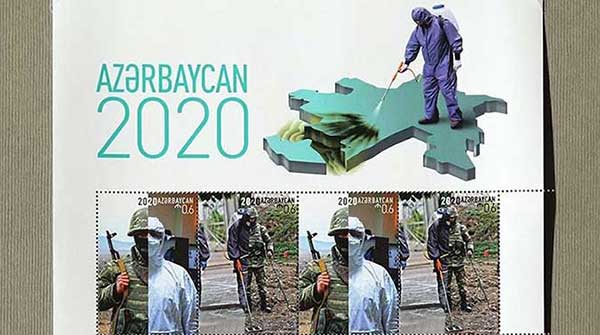Now is the time for the world to step in to supply and protect the population of Artsakh
 The Armenian Genocide was rarely discussed throughout the Cold War to avoid offending descendants of the Ottoman perpetrators. Today, very few countries outright deny the brutality that took place. Unfortunately, two of the perpetrators, Turkey and Azerbaijan, surround the Armenian populations which remain in the south Caucasus region.
The Armenian Genocide was rarely discussed throughout the Cold War to avoid offending descendants of the Ottoman perpetrators. Today, very few countries outright deny the brutality that took place. Unfortunately, two of the perpetrators, Turkey and Azerbaijan, surround the Armenian populations which remain in the south Caucasus region.
At this moment, the world stands by as they again progress toward extermination.
The topic of genocide is one that many of us try to avoid, perhaps because it reveals something uncomfortable about our human nature: we have the capacity to kill one another in mass numbers. What we don’t realize, however, is that our willful avoidance of collective self-reflection is itself one of the primary causes of genocide.
Gregory Stanton, former head of the International Association of Genocide Scholars (IAGS), has noted that there are 10 progressive stages of genocide, with mass extermination being stage nine and denial being stage 10. Stanton explains why genocide happens and how the movement toward mass killing can be halted at each stage. The earlier the intervention, the easier it is to stop genocide from happening.
 |
| Related Stories |
| Western leaders ignore their own genocidal acts
|
| Is the West judging Ethiopian Prime Minister Abiy Ahmed fairly?
|
| The U.S. needs to reset its approach to the conflict in Ethiopia
|
To understand current tensions in the south Caucasus, it is essential to acknowledge the arrogance of the leaders of the Soviet Union, who created borders under the assumption that their empire would never fall. Azerbaijan and Armenia were both Soviet republics, but their borders intertwined with their populations. When the Soviet Union broke up, they fought a war to define their territories. It resulted in a tense standoff that continues today, with armed conflict flaring up from time to time, most notably in 2020.
Today, the most endangered Armenian population lives in the Artsakh region, also known as Nagorno-Karabakh. They are surrounded by Azerbaijan, and Azerbaijani leaders have made it clear that they want to annex this territory, even though the population voted 92 percent in a referendum to remain separate.
If one examines the situation, one can see the steady progress toward extermination. In fact, the IAGS has strongly condemned recent actions by Azerbaijan.
The progressive stages of genocide begin with classification, symbolization, discrimination, dehumanization, organization, and polarization. There is a sentiment of “Armenophobia” in both Azerbaijan and Turkey; both were involved in the armed conflict in 2020. The Azerbaijani dictatorship has gained power through the sale of fossil fuels in recent years, built up its military, and backed a campaign of aggressive anti-Armenian propaganda, the most haunting being a postage stamp showing an exterminator spraying Artsakh.
After fighting broke out in 2020, Russia negotiated a settlement and sent peacekeepers to the region. Russia has grown less enthusiastic about keeping the peace in recent months, however, possibly to protect the covert sale of Russian fossil fuels, which may be flowing through Azerbaijan due to official sanctions against Russia after it invaded Ukraine.
Since December, Azerbaijan – with Russia’s acceptance – has blocked the only road bringing supplies between Armenia and Artsakh. This siege of ethnic Armenians has resulted in tremendous hardship for a population cut off from food and fuel throughout the winter months.
Stages seven and eight of genocide are preparation and persecution, respectively. Populations are isolated and forcibly starved of food and other resources. Given the historical patterns of mass violence, it is reasonable to assume that a military invasion of Artsakh is being planned.
Stanton not only illustrated how genocide progresses toward extermination, but he also explained how it can be prevented at each stage. Stages seven and eight require humanitarian aid to the victims and armed intervention to defend them if necessary.
Now is the time for the world to step in to supply and protect the population of Artsakh. If we choose not to act, if we knowingly sit back and watch them be destroyed, we will have to face the uncomfortable truth that we are all complicit in this genocide.
Gerry Chidiac specializes in languages, genocide studies and works with at-risk students. He is the recipient of an award from the Vancouver Holocaust Education Centre for excellence in teaching about the Holocaust.
For interview requests, click here.
The opinions expressed by our columnists and contributors are theirs alone and do not inherently or expressly reflect the views of our publication.
© Troy Media
Troy Media is an editorial content provider to media outlets and its own hosted community news outlets across Canada.

